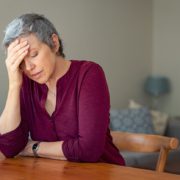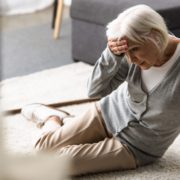3 Reasons Your Vertigo Gets Worse in Winter
If you’ve ever suffered from an episode of vertigo, then you already know how debilitating it can be, and you never want it to happen again.
Vertigo is a sensation where the environment around you spins, making you feel dizzy and off-balance. When you’re experiencing a severe episode of vertigo, it can be a real feeling of helplessness. The feeling of dizziness can be so severe that you can’t even get out of bed, never mind walk or drive anywhere.
Vertigo attacks can happen at any age and any time.
Nearly 40% of Americans will experience vertigo at least once in their lifetime, it’s more common in folks over age 65, it affects women more than men, and we see more occurrences in Winter than Summer. Technically, vertigo is a symptom and not a condition itself. A common cause of vertigo is from something called Benign Paroxysmal Positional Vertigo (BPPV).
BPPV occurs when a clump of crystals in your inner ear moves. This causing a severe spinning sensation when moving your head. It’s “benign” to those who have never experienced an episode. Since Winter is coming – there’s a good chance it could get triggered.
Here are three reasons why Vertigo is worse in Winter:
1. Low Vitamin D Levels
Vitamin D is made in the skin when it’s exposed to sunlight – therefore – sun exposure is our best way to keep Vitamin D levels high. If you live in an area like New England, keeping your Vitamin D levels adequate all year long (especially in Winter) can be challenging. Studies have shown a close correlation between low levels of Vitamin D and BPPV.
This could explain why we see more cases of vertigo in the Winter.
In one North Korean study, they looked at 957 people who suffered from BPPV and were already being treated successfully with specific head movements. About half the group (who had low Vitamin D levels to begin with) started taking Vitamin D supplements. After one year – they compared the two groups – and found the supplement-taking folks had lower occurrences of their BPPV compared to the non-supplement-taking group.
If you’re prone to BPPV, and you live in a climate that gets lower sunlight this time of year, it might help your vertigo if you start supplementing with Vitamin D.
2. Less Physical Activity
Another unintended consequence of Winter is less physical activity. When it’s dark upon rising, and dark again by 4:30p, you’re just not as motivated to get out and walk, run, or bike ride.
Therefore, we tend to get a bit more sedentary in the Winter.
Prolonged periods of rest in reclined, sedentary positions is a known trigger for BPPV. That’s another reason we see an uptick in vertigo during Winter. People are simply not as active and lying down more.
Making an extra effort to stay active in Winter could go a long way in helping decrease your vertigo. Try scheduling an exercise class you’re held accountable to. This could help you resist the urge to hit the snooze button or go straight home to your recliner.
3. More Ear Infections
Winter allergies are a “thing” and can lead to fluid buildup in your inner ear. This creates a prime breeding ground for bacteria and can turn into an ear infection.
Your vestibular system is located deep within your inner ear and something like an ear infection can disrupt its function. Think of it as a stereo system. The left and right ears work together but send separate signals to your brain. If the signal from one ear is disrupted by an infection – our brains will get confused. This will trigger symptoms of dizziness and loss of balance (vertigo).
Are you already know you’re prone to episodes of vertigo or BPPV? You’ll want to take extra precaution in the Winter to try and avoid ear infections. If your vertigo tends to flare up every Winter – hopefully this information helps. It’s important to understand why this could be happening. More importantly – what you can do to avoid it.
But regardless of whether you suffer from vertigo more during Winter or not – the good news is that it’s a very treatable condition any time of year. BPPV is the most common cause of vertigo and it can be treated in as little as four sessions by a Vestibular Specialist.
Are you local to Portsmouth, NH?
Our vestibular specialist has a few openings available for the rest of the year. CLICK HERE to schedule your discovery visit and we will see if we’re a good fit to help – and get you on a treatment plan right away.
Dr. Carrie Jose, Physical Therapist and Pilates expert, owns CJ Physical Therapy & Pilates in Portsmouth and writes for Seacoast Media Group. To get in touch, or get her free guide for getting rid of vertigo naturally, visit CLICK HERE or email [email protected].



